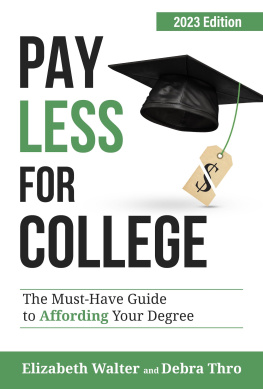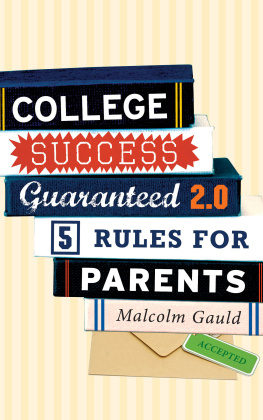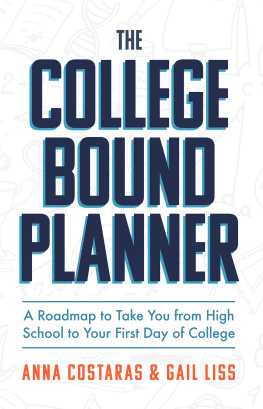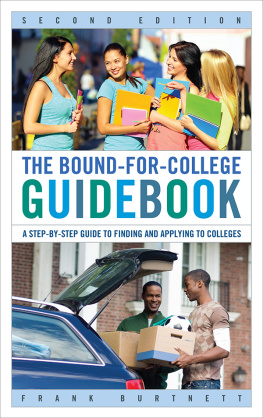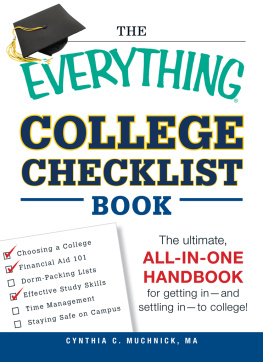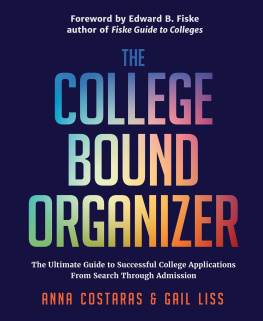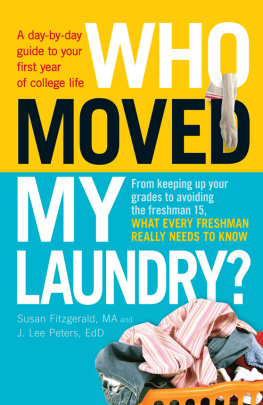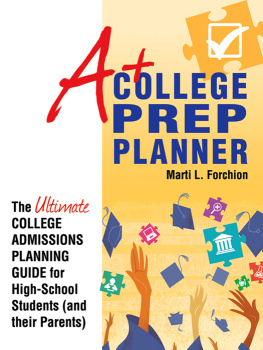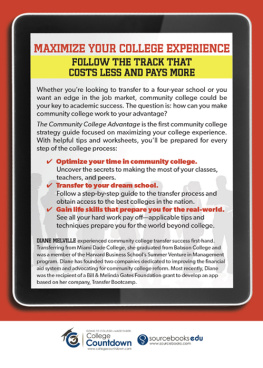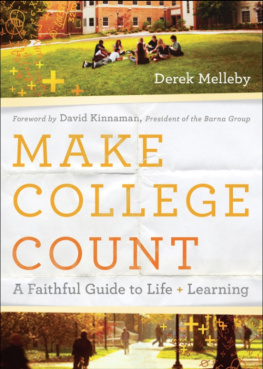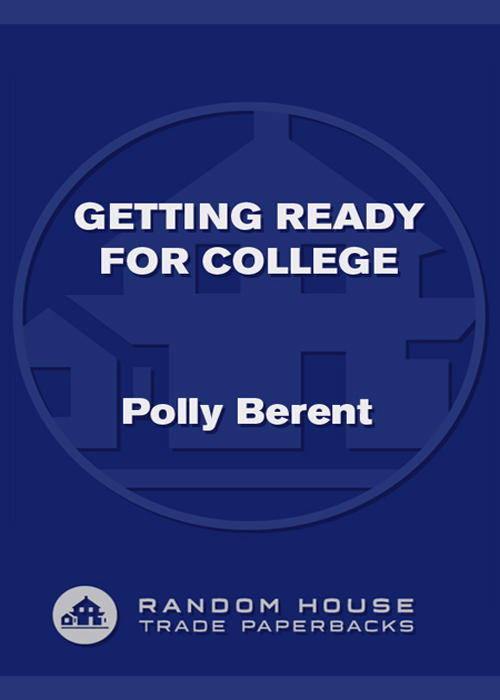
getting
ready for
college
POLLY BERENT

contents
For
TONY DITTMER
and
KATIE HALL
foreword
Every year, three million incredibly well prepared students enter college. As early as their sophomore year of high school, most of these college freshmen had received their first glossy view book from College A peddling their educational experience as second to none. Most were bombarded with information about applying to and choosing the college that was right for them, and, equipped with excellent, easily accessible resources, they did their own research as well. By the time they actually arrive on campus, most have visited the campus during the summer, attended a fall open house, interviewed, spent a night on campus once admitted, and attended summer orientation.
All of this preparation leads up to the first day of college, when parents (many of whom have been nearly as involved in the process as their offspring) drop off their sons and daughters and wave goodbye. Each student, standing there as the car pulls away, is suddenly aware that there are no handouts or instructional videos offering further information and advice. The parents, meanwhile, are crossing their fingers, hoping their kid will figure it all out.
If this fear seems very real to you, dont be embarrassed. This book was written to address any and all questions freshmen and their parents may have. It answers an unmet need for something more than a CliffsNotes version of what to do once you arrive on campus. Youve done yourself a major favor by buying the only survival guide youll need to successfully avoid possible pitfalls and get through the first year.
This book is not an attempt to marginalize the efforts of student affairs offices across the country. Its mission is to fill in the gaps where even the most robust, detailed student orientation packet may fall short. Offered here is an easy-to-read, step-by-step guide thats got your back from the day you first walk into Wal-Mart to buy those extra-long sheets all the way to your final exams. Simply put, Getting Ready for College is a soup-to-nuts resource that will arm both students and their families with the best, most practical insider information available, enabling a seamless transition into college life.
Addressed in this book are the concerns of many stu-dents and their families. Youll find list upon list of helpful tips, from how to exercise NATO-like diplomacy skills with your roomie to how to make your crib more than just a place to crash. Youll also find hard-nosed advice on time management, choosing a major, health care, managing finances, writing papers, professors office hours, building your first loft, and even social life. You will learn not just how to best navigate the process, but also how to avoid indecision, frustration, and wasted time along your route.
If the authors expert advice isnt enough to convince you that this information is essential, take it from current college students and the words of their sworn testimonials. These students are an invaluable resource, as life lessons are seldom found in college view books and youll be hard pressed to hear about them on a campus tour. Its odd, really, that the stories of the true college expertsthe studentsare so seldom tapped for their practical insights. Not to worry, thoughin this book, the keg is trapped and flowing with the unfiltered opinion of students. No spin doctors here!
A simplified, demystified view of life at college is what students and parents need most, and that is exactly what this book will provide. Remember: for every fear or question you have about college, theres an answer. So equip yourself with the solid, seasoned advice of those who have gone through the process and made it out alive, and you will be ready for college.
Robert Franek
Editorial Director, The Princeton Review
introduction
When my son returned from his first year of college, there were many things he wished he had known about beforehand. He got together with his high school friends and told sad tales of how he had had not one but two bikes stolen. They immediately chimed in with their own stories. Many of them had also learned the hard way to cope with all kinds of surprises, both great and small, during their first year on campus.
Thinking that sharing what these kids had learned might provide other college-bound students with brighter and less costly beginnings, I decided to see what else I could discover. What do you wish someone had told you before you left for college? Their amazingly open and enthusiastic responses to this question on a wide range of topicsfrom things to bring to things to think aboutare the heart of this guide.
It turned out to be a fascinating project. It was also a lot of fun. So I continued to follow up with these twenty students throughout their college years, and with scores of others long after my son and his friends had graduated.
May you find this collection of individual stories, tips, insights, and hindsights helpful as you prepare for college. I also hope it will provide you and your parents with a realistic view of college life.
Sections on career planning and jobs are more recent additions. They will serve as a resource when you declare a major or choose a career. Going to college is a wonderful and sometimes scary opportunity. Its a time to be on your own, make new friends, explore new ideas, and carve out a niche in a totally new place. However, I hope that along with all this freedom and exploration you will also discover something you want to do when you get out. But first you must begin.
Have a very good year!
Polly Berent
things to bring
Before you start packing your bags and loading the van, there are two things you should do. First, check to see if your college has mailed you a suggested list of things you will need to bring. If not, many schools provide this kind of information online. Pull up your schools website and click on residential or dormitory housing. You may be able to take a tour of the rooms and check out dimensions. (Think small!) In addition to providing information such as whether you should bring regular or extra-long sheets for your bed, there may be helpful hints about leaving pets and power tools at home.
The second thing to do is to call university housing to find out who your roommate will be.
It was good to get to know a little bit about him before we actually met. We decided in advance which of us would bring the big itemsrefrigerator, microwave, TV, fan. By avoiding duplication, we saved both money and valuable room space.
Heres a composite list of what twenty students we interviewed took with them to college.
Caution: In August, many discount and specialty stores feature aisles overflowing with items just for the dormall in bright colors, too. Dont get carried away. Remember: Packing for college is an art, not a science. It depends on judgment.
basics
clothes
lots of clothes hangers
socks and underwear
baseball cap for bad hair days
raincoat or parka/umbrella
boots (rain, snow)
laundry bag/basket and detergent
quarters (lots of them)
small drying rack
iron/tabletop ironing board (maybe)
regular (or extra-long) twin sheets and pillowcases
Next page

